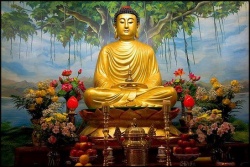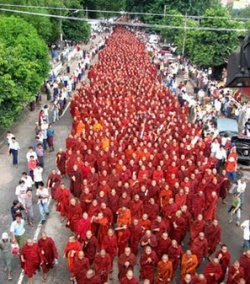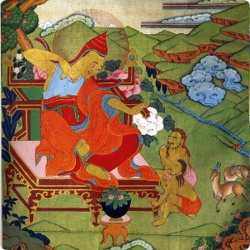Difference between revisions of "The concept of time in Buddhism"
m (Text replacement - "conception" to "conception") |
|||
| (4 intermediate revisions by 3 users not shown) | |||
| Line 1: | Line 1: | ||
[[File:757620 n.jpg|thumb|250px|]] | [[File:757620 n.jpg|thumb|250px|]] | ||
| + | |||
| + | |||
| + | |||
| + | |||
| + | |||
| + | |||
| + | |||
| + | |||
<poem> | <poem> | ||
| − | The [[Prasangikas]] of the [[Madhyamaka]] have a unique conception of [[Time]]. Chapter 5 of Cozort's Unique {{Wiki|Tenets}} Of The [[Middle Way]] Consequence School addresses their arguments. Here's a selection: | + | The [[Prasangikas]] of the [[Madhyamaka]] have a unique {{Wiki|conception}} of [[Time]]. [[Chapter]] 5 of Cozort's Unique {{Wiki|Tenets}} Of The [[Middle Way]] [[Consequence School]] addresses their arguments. Here's a selection: |
| + | |||
| + | |||
| + | From among the three times, the {{Wiki|present}} is main and the {{Wiki|past}} and {{Wiki|future}} are secondary, because the {{Wiki|present}} is posited by way of having been produced and not having disintegrated ' Past and {{Wiki|future}}, on the other hand, are posited not in their [[own]] terms but in terms of the {{Wiki|present}}. They | ||
| + | |||
| + | must be posited in [[dependence]] on the {{Wiki|disintegration}} or non-production of another thing, whereas the {{Wiki|present}} does not. Also, the {{Wiki|present}} is main because it is observed now (whereas {{Wiki|past}} and {{Wiki|future}} are not directly [[perceived]] by ordinary persons). [[Candrakirti's]] Commentary on ([[Aryadeva's]]) "Four Hundred" says, "The {{Wiki|present}} is main because it is observed now." | ||
| + | |||
| + | |||
| + | Still, even though the {{Wiki|past}} and {{Wiki|future}} are secondary, there is mutual [[interdependence]] of all three times such that in [[order]] for one to appear to a person's [[mind]], aspects of the others also must appear. The {{Wiki|present}} cannot be posited without relying on the other two times. Why? It is necessary to say, "has been produced," in [[order]] to eliminate the possibility that something has not come (due to temporarily incomplete [[conditions]], though the [[causes]] [[exist]]) and "not | ||
| + | |||
| + | |||
| + | ceased," to eliminate the possibility of it [[being]] {{Wiki|past}}. In other words, to realize "{{Wiki|present}}," which requires [[realization]] of the present's [[defining characteristics]], necessitates a negative route, an elimination of what it is not. [[Candrakirti]] says in his Commentary on ([[Aryadeva's]]) "Four Hundred," "Those three times also are [[interdependent]] because each does not [[exist]] without depending on the [other] two," and [[Dzongkaba's]] [[Ocean of Reasoning]] says: | ||
| − | |||
| − | |||
| − | Since one must posit the present with regard to what has not crossed or not passed [[beyond]] that, it is contradictory for the present not to depend on the past. Therefore, the future also must indirectly depend on the past because something is posited as future due to not having come in the present. | + | Since one must posit the {{Wiki|present}} with regard to what has not crossed or not passed [[beyond]] that, it is [[contradictory]] for the {{Wiki|present}} not to depend on the {{Wiki|past}}. Therefore, the {{Wiki|future}} also must indirectly depend on the {{Wiki|past}} because something is posited as {{Wiki|future}} due to not having come in the {{Wiki|present}}. |
[[File:Nks.jpg|thumb|250px|]] | [[File:Nks.jpg|thumb|250px|]] | ||
| − | Hence, not only does presentness depend upon pastness and futureness, but the futureness of a pot depends on both present and past. It is obvious that the future depends on the present, for the future is posited in [[relation]] to the present, and it is equally obvious that the present depends on the past, for the present is not established without eliminating the past. In addition, by this route it can be said that futureness depends on pastness. Even though futureness occurs before the [[object]], it is dependent not on that [[object]] but also on that thing's having disintegrated. | + | |
| + | |||
| + | Hence, not only does presentness depend upon pastness and [[futureness]], but the [[futureness]] of a pot depends on both {{Wiki|present}} and {{Wiki|past}}. It is obvious that the {{Wiki|future}} depends on the {{Wiki|present}}, for the {{Wiki|future}} is posited in [[relation]] to the {{Wiki|present}}, and it is equally obvious that the {{Wiki|present}} depends on the {{Wiki|past}}, for the {{Wiki|present}} is not established without eliminating the {{Wiki|past}}. In addition, by this route it can be said that [[futureness]] depends on pastness. Even though [[futureness]] occurs before the [[object]], it is dependent not on that [[object]] but also on that thing's having disintegrated. | ||
| + | |||
| + | |||
It's complicated and depends on [[conceptualizing]] the disintegrated-ness (or having-not-yet-arisen-ness) or absence of something as [[being]] a functioning thing. | It's complicated and depends on [[conceptualizing]] the disintegrated-ness (or having-not-yet-arisen-ness) or absence of something as [[being]] a functioning thing. | ||
| − | Tsongkhapa's Ocean of {{Wiki|Reasoning}} addresses [[time]] in the chapter "Examination of Time": | + | |
| + | |||
| + | [[Tsongkhapa's]] Ocean of {{Wiki|Reasoning}} addresses [[time]] in the [[chapter]] "Examination of Time": | ||
[[File:Dharmakirti002.JPG|thumb|250px|]] | [[File:Dharmakirti002.JPG|thumb|250px|]] | ||
| − | |||
| − | |||
| − | + | The [[prasangika-madhyamikas]] maintain that all three {{Wiki|temporal}} periods are things. As it has been proven in the seventh [[chapter]], the two {{Wiki|temporal}} periods in which something has disintegrated and in which it has yet to arise are things. However, since it is not maintained that each thing such as a sprout has three {{Wiki|temporal}} stages, this is different from the [[Vaibhasika]] view. | |
| − | |||
| − | |||
| − | + | On the other hand one might argue as follows: Since it has been asserted that the {{Wiki|disintegration}} of the disintegrated sprout constitutes a homogeneous {{Wiki|continuum}}, and since the [[moment]] when it has arisen and not yet ceased is its {{Wiki|present}}, it would follow that [[being]] {{Wiki|present}} and [[being]] disintegrated are not mutually exclusive. | |
| − | |||
| − | |||
| − | Since he says that it is found by the uncontaminated [[wisdom]] that [[perceives]] things as they really are, and does not [[exist]] inherently, he refutes those who say that anything that can be found by the uncontaminated [[wisdom]] of [[meditative]] equipoise is truly existent. | + | We commit no such error, because the first [[moment]] of the {{Wiki|disintegration}} of the sprout is the {{Wiki|disintegration}} of the sprout. The disintegrations of its homogeneous stages are the successive disintegrations of its previous moments. And each {{Wiki|disintegration}} is a {{Wiki|past}}. At the [[time]] when the {{Wiki|disintegration}} of the sprout [[exists]], it is not disintegrated; but in general, since it is a {{Wiki|disintegration}} it is, as such, in the {{Wiki|past}}. |
| + | |||
| + | |||
| + | |||
| + | So, the homogeneous {{Wiki|continuum}} of anything in the {{Wiki|past}} must be posited as an {{Wiki|entity}} itself on the grounds of the {{Wiki|disintegration}} of a different thing. Therefore, there is a major [[difference]] between the {{Wiki|past}} and the other two {{Wiki|temporal}} periods. Similarly, any homogeneous {{Wiki|continuum}} in the {{Wiki|future}} must be posited as an {{Wiki|entity}} itself just on the basis of some other thing not yet [[being]] arisen. Thus there is a major | ||
| + | |||
| + | |||
| + | [[difference]] between the {{Wiki|future}} and the other two {{Wiki|temporal}} periods. So as far as the {{Wiki|present}} is concerned, it is like an arisen but not yet ceased sprout, which neither needs to be posited on the basis of the {{Wiki|disintegration}} of some other thing, nor on the basis of some other thing not yet arisen. Therefore there is a major [[difference]] between it and {{Wiki|future}} moments that are neither arisen nor ceased. | ||
| + | |||
| + | |||
| + | |||
| + | I think at a {{Wiki|conventional}} level everyone accepts [[time]], though from the [[ultimate]] {{Wiki|perspective}} it cannot be asserted as {{Wiki|real}}. [[Time]] is established based on [[phenomena]] which are in themselves [[empty]]. | ||
| + | |||
| + | |||
| + | |||
| + | I think at the end of the day [[Madhyamaka]] doesn't tolerate [[metaphysics]] as anything more than [[appearances]]. | ||
| + | |||
| + | |||
| + | |||
| + | according to [[Madhyamakavatara]], the [[characteristic]] of [[ultimate truth]] is said to be that which is found through [[seeing]] the facticity of a genuine [[object]] of [[knowledge]] The auto commentary says, | ||
| + | |||
| + | |||
| + | The [[ultimate]] is the [[nature]] that is found by [[being]] the [[object]] of a particular kind of [[wisdom]] of those who see [[reality]]. But it does not [[exist]] through its [[own]] [[nature]]. This is one of its natures. | ||
| + | |||
| + | |||
| + | |||
| + | Since he says that it is found by the uncontaminated [[wisdom]] that [[perceives]] things as they really are, and does not [[exist]] inherently, he refutes those who say that anything that can be found by the uncontaminated [[wisdom]] of [[meditative]] equipoise is [[truly existent]]. | ||
</poem> | </poem> | ||
| + | |||
| + | |||
| + | |||
{{R}} | {{R}} | ||
[http://www.reddit.com/r/Buddhism/comments/16jtuc/the_concept_of_time_in_buddhism/ www.reddit.com] | [http://www.reddit.com/r/Buddhism/comments/16jtuc/the_concept_of_time_in_buddhism/ www.reddit.com] | ||
| + | [[Category:Buddhist Terms]] | ||
| + | [[Category:Buddhism]] | ||
[[Category: Buddhism and Time]] | [[Category: Buddhism and Time]] | ||
| + | [[Category:Tibetan Buddhism]] | ||
Latest revision as of 01:47, 13 May 2023
The Prasangikas of the Madhyamaka have a unique conception of Time. Chapter 5 of Cozort's Unique Tenets Of The Middle Way Consequence School addresses their arguments. Here's a selection:
From among the three times, the present is main and the past and future are secondary, because the present is posited by way of having been produced and not having disintegrated ' Past and future, on the other hand, are posited not in their own terms but in terms of the present. They
must be posited in dependence on the disintegration or non-production of another thing, whereas the present does not. Also, the present is main because it is observed now (whereas past and future are not directly perceived by ordinary persons). Candrakirti's Commentary on (Aryadeva's) "Four Hundred" says, "The present is main because it is observed now."
Still, even though the past and future are secondary, there is mutual interdependence of all three times such that in order for one to appear to a person's mind, aspects of the others also must appear. The present cannot be posited without relying on the other two times. Why? It is necessary to say, "has been produced," in order to eliminate the possibility that something has not come (due to temporarily incomplete conditions, though the causes exist) and "not
ceased," to eliminate the possibility of it being past. In other words, to realize "present," which requires realization of the present's defining characteristics, necessitates a negative route, an elimination of what it is not. Candrakirti says in his Commentary on (Aryadeva's) "Four Hundred," "Those three times also are interdependent because each does not exist without depending on the [other] two," and Dzongkaba's Ocean of Reasoning says:
Since one must posit the present with regard to what has not crossed or not passed beyond that, it is contradictory for the present not to depend on the past. Therefore, the future also must indirectly depend on the past because something is posited as future due to not having come in the present.
Hence, not only does presentness depend upon pastness and futureness, but the futureness of a pot depends on both present and past. It is obvious that the future depends on the present, for the future is posited in relation to the present, and it is equally obvious that the present depends on the past, for the present is not established without eliminating the past. In addition, by this route it can be said that futureness depends on pastness. Even though futureness occurs before the object, it is dependent not on that object but also on that thing's having disintegrated.
It's complicated and depends on conceptualizing the disintegrated-ness (or having-not-yet-arisen-ness) or absence of something as being a functioning thing.
Tsongkhapa's Ocean of Reasoning addresses time in the chapter "Examination of Time":
The prasangika-madhyamikas maintain that all three temporal periods are things. As it has been proven in the seventh chapter, the two temporal periods in which something has disintegrated and in which it has yet to arise are things. However, since it is not maintained that each thing such as a sprout has three temporal stages, this is different from the Vaibhasika view.
On the other hand one might argue as follows: Since it has been asserted that the disintegration of the disintegrated sprout constitutes a homogeneous continuum, and since the moment when it has arisen and not yet ceased is its present, it would follow that being present and being disintegrated are not mutually exclusive.
We commit no such error, because the first moment of the disintegration of the sprout is the disintegration of the sprout. The disintegrations of its homogeneous stages are the successive disintegrations of its previous moments. And each disintegration is a past. At the time when the disintegration of the sprout exists, it is not disintegrated; but in general, since it is a disintegration it is, as such, in the past.
So, the homogeneous continuum of anything in the past must be posited as an entity itself on the grounds of the disintegration of a different thing. Therefore, there is a major difference between the past and the other two temporal periods. Similarly, any homogeneous continuum in the future must be posited as an entity itself just on the basis of some other thing not yet being arisen. Thus there is a major
difference between the future and the other two temporal periods. So as far as the present is concerned, it is like an arisen but not yet ceased sprout, which neither needs to be posited on the basis of the disintegration of some other thing, nor on the basis of some other thing not yet arisen. Therefore there is a major difference between it and future moments that are neither arisen nor ceased.
I think at a conventional level everyone accepts time, though from the ultimate perspective it cannot be asserted as real. Time is established based on phenomena which are in themselves empty.
I think at the end of the day Madhyamaka doesn't tolerate metaphysics as anything more than appearances.
according to Madhyamakavatara, the characteristic of ultimate truth is said to be that which is found through seeing the facticity of a genuine object of knowledge The auto commentary says,
The ultimate is the nature that is found by being the object of a particular kind of wisdom of those who see reality. But it does not exist through its own nature. This is one of its natures.
Since he says that it is found by the uncontaminated wisdom that perceives things as they really are, and does not exist inherently, he refutes those who say that anything that can be found by the uncontaminated wisdom of meditative equipoise is truly existent.


